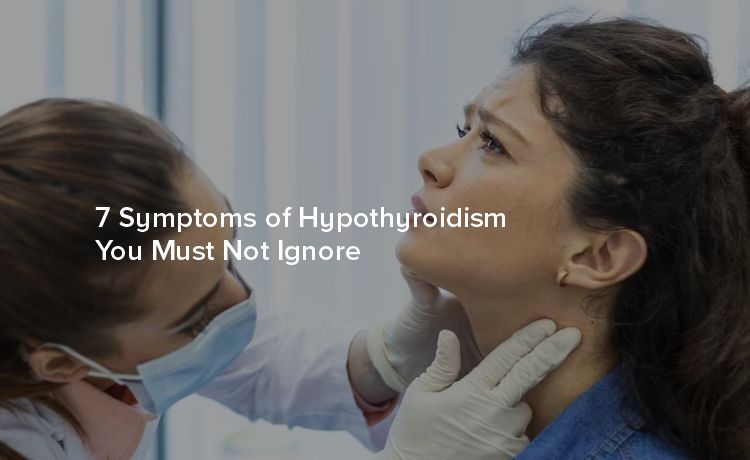
Hypothyroidism, a condition where the thyroid gland does not produce enough thyroid hormones, often goes undiagnosed because its symptoms can be subtle and easily mistaken for other health issues. However, recognizing the signs of hypothyroidism is crucial for early diagnosis and effective management. Below, we explore seven symptoms of hypothyroidism that you must not ignore.
One of the most prevalent symptoms of hypothyroidism is extreme fatigue. Unlike regular tiredness, the fatigue associated with hypothyroidism doesn't improve with rest. The body's metabolism slows down due to insufficient thyroid hormone production, leading to a constant feeling of exhaustion.
Why It Happens:
Thyroid hormones play a critical role in energy production. When these hormones are low, every cell in the body works less efficiently, leading to a pervasive sense of fatigue.
What to Do:
If you find yourself feeling unusually tired despite getting adequate sleep, it might be time to consult a healthcare professional for a thyroid function test.
Gaining weight without a change in diet or exercise habits can be a red flag for hypothyroidism. This symptom can be particularly frustrating as it may occur even
when you are maintaining a healthy lifestyle.
Why It Happens:
Low thyroid hormone levels slow down metabolism, causing the body to store more calories as fat, leading to weight gain.
What to Do:
Monitor your weight and consult with a physician if you notice significant weight gain without lifestyle changes. A blood test can determine if hypothyroidism is the cause.
Feeling unusually cold, especially in your hands and feet, may be a sign of hypothyroidism. This symptom is often accompanied by a general feeling of being cold all the time.
Why It Happens:
Thyroid hormones help regulate body temperature. When these hormones are low, the body’s ability to generate heat decreases, leading to increased sensitivity to cold.
What to Do:
Take note of how often you feel cold compared to others around you. If you consistently feel colder, consult your healthcare provider for further evaluation.
Dry, coarse hair and dry, flaky skin can be indicators of hypothyroidism. These symptoms occur because the slowed metabolism affects the skin’s ability to replenish and maintain moisture.
Why It Happens:
Reduced thyroid hormone levels result in slower cell regeneration, leading to dry skin and hair.
What to Do:
If you notice persistent dryness of your skin and hair, it might be worth discussing with your doctor. They can check if a thyroid issue is at the root of your problems.
Hypothyroidism can have a profound impact on your mental health, leading to depression, mood swings, and even memory problems. These symptoms are often overlooked as they can be attributed to various other causes.
Why It Happens:
Thyroid hormones affect neurotransmitter activity in the brain. Low levels of these hormones can result in mood disturbances and cognitive issues.
What to Do:
If you experience unexplained depression or mood swings, consider getting a thyroid function test. Proper diagnosis and treatment can significantly improve your mental health.
Hypothyroidism can cause muscle weakness, cramps, and joint pain. These symptoms might be mild at first but can become more pronounced over time.
Why It Happens:
Thyroid hormones are essential for muscle and joint function. A deficiency can lead to reduced muscle strength and joint discomfort.
What to Do:
Keep track of persistent muscle and joint pains and discuss them with your doctor. Early intervention can help manage these symptoms effectively.
For women, hypothyroidism can cause irregular menstrual cycles and even infertility. These symptoms are often misdiagnosed as they can result from various other health issues.
Why It Happens:
Thyroid hormones play a key role in regulating the menstrual cycle and reproductive health. Low levels can disrupt this balance, leading to irregular periods and fertility issues.
What to Do:
If you experience changes in your menstrual cycle or have difficulty conceiving, it might be worth investigating your thyroid health.
Recognizing the symptoms of hypothyroidism is the first step towards effective management and treatment. If you suspect you may have hypothyroidism, consult a healthcare professional for a thorough evaluation. Early diagnosis and treatment can significantly improve your quality of life and prevent complications associated with untreated hypothyroidism. Book an appointment with our experts for the best endocrinology treatment in Hyderabad.
Dr M. Suneetha is one of the top medical oncologists in Gurugram. He has a vast experience of more than 30 years in the field of Medical oncology. He his specialised in treating leukemia,lymphoma, hematological oncology and other complex oncology cases . He is also specialised in Bone Marrow Transplantation (BMT) treatment. He is working as a Senior Consultant, HOD, Medical Oncologist in American Oncology Institute, Gurugram.